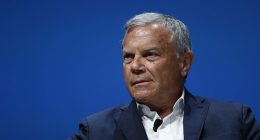
Opinions expressed by Entrepreneur contributors are their own.
You’re reading Entrepreneur Middle East, an international franchise of Entrepreneur Media.
Once hailed as a key component of entrepreneurial success, traditional business plans are now being challenged by visionaries like Steve Blank, Reid Hoffman, Alexander Osterwalder, and Brad Feld. These thought leaders argue that business plans can stifle innovation, and hinder an entrepreneur’s ability to adapt in a rapidly changing landscape. They can see that adaptability and an iterative approach are more likely to lead to sustainable growth and long-term success. In the ever-changing landscape of entrepreneurship, it’s time to debunk the myth of the business plan, and embrace experiments as the driving force behind success. As Blank wisely stated: “No plan survives first contact with customers.”
Traditional business plans fail to account for the uncertainties and complexities of the entrepreneurial journey. Imagine a young entrepreneur named Sarah who had meticulously planned every aspect of her venture based on a traditional business plan. She believed that she had a foolproof strategy that would lead to success. However, as she launched her product into the market, she realized that things rarely go as planned. Customers had different needs and preferences than what she had anticipated. The market landscape shifted rapidly, and Sarah found herself struggling to adapt.
Feeling frustrated and stuck, Sarah came across an article by the aforementioned Blank. In it, he challenged the notion of rigid business plans, and advocated for embracing experimentation instead. Inspired by his insights, Sarah decided to take a different approach. She started running experiments to test her assumptions and gather real-world feedback. Through experimentation, Sarah quickly learned that her initial value proposition was not resonating with customers. Armed with this valuable insight, she iterated and refined her product, incorporating the feedback she received. This iterative process allowed her to create a solution that truly addressed customer needs and preferences.
As Sarah delved deeper into the world of entrepreneurship, she also discovered the Lean Startup methodology. Blank’s approach emphasized rapid iteration, validated learning, and customer-centricity. She realized that rather than relying on speculative forecasts outlined in a traditional business plan, she could build a minimum viable product (MVP), and gather feedback to inform her decisions. Sarah also learned about Osterwalder’s Business Model Canvas, a visual framework that helped her map out key elements of her business model. By integrating experiments within the canvas, Sarah could validate critical assumptions, identify potential risks, and refine her model based on real-world feedback. The canvas became her dynamic compass, guiding her through the entrepreneurial journey.
With each experiment and iteration, Sarah navigated the uncertainties of entrepreneurship with resilience and adaptability. She embraced uncertainty as an opportunity for growth and learning. Instead of being paralyzed by the fear of the unknown, she approached it as a chance to uncover new insights, and make data-driven decisions. And as Sarah continued to refine her business and build traction, she faced the challenge of pitching to investors. Knowing that some investors might raise concerns about the absence of a traditional business plan, she crafted a compelling narrative. She articulated the value of experimentation and customer validation, showcasing successful examples of startups that thrived through this approach. She highlighted how the iterative feedback loop allowed these startups to pivot, refine their strategies, and align their offerings with customer needs.
Related: Global Outlook, Local Roots: Equiti Group Co-Founders Iskandar Najjar And Mohamed Al Ahmad
In her investor pitch, Sarah invoked the words of Feld, who famously said, “Financial projections for startups are largely fiction. We know that 100% of financial projections from startups are wrong.” She emphasized that the true value of the business plan lies not in the document itself, but in the process of researching and thinking about the business in a systematic way. By embracing experiments, Sarah was better equipped to build a scalable business model, and make informed decisions based on real-world data. As Sarah’s entrepreneurial journey progressed, she realized that embracing experiments was the key to her success. She had learned from the wisdom of thought leaders like Blank, Hoffman, Osterwalder, and Feld. Their insights shattered the myth of the business plan, and empowered her to take a more agile and adaptive approach.
Much like Sarah, it’s time for entrepreneurs to challenge the status quo, and embrace experiments as the driving force behind their enterprises. Sarah’s story is just one example of how embracing experiments can transform the entrepreneurial journey. By adopting an experimental mindset, entrepreneurs can break free from the constraints of traditional business plans, and open themselves up to a world of possibilities. Entrepreneurship is a dynamic and ever-evolving process. The world is changing at an unprecedented pace, and successful entrepreneurs are those who can adapt quickly and effectively. As Hoffman once said: “Starting a company is like throwing yourself off the cliff, and assembling an airplane on the way down.” The ability to navigate uncertainty and pivot based on real-world feedback is what sets apart thriving startups from those that falter.
The myth of the business plan is deeply ingrained in our perception of entrepreneurship. We have been conditioned to believe that a detailed plan is necessary for success. However, as Feld pointed out, financial projections from startups are often wrong. The unpredictable nature of the business landscape makes it nearly impossible to accurately predict the future. Instead of relying on speculative forecasts, entrepreneurs should focus on building a scalable business model that can adapt and thrive in any situation. Experimentation allows entrepreneurs to test their assumptions, validate their ideas, and gather valuable insights from real customers. It enables them to iterate quickly, incorporating feedback and improving their products or services. As Blank emphasized, startups now search for business models, rather than executing predetermined plans. The process of experimentation becomes a critical part of the journey, enabling entrepreneurs to find the right path forward.
The Lean Startup methodology thus provides a roadmap for embracing experimentation. By building a minimum viable product and gathering feedback, entrepreneurs can make informed decisions, and steer their ventures in the right direction. This iterative process of build-measure-learn allows entrepreneurs to continuously improve and adapt, ultimately increasing their chances of success. Meanwhile, Osterwalder’s Business Model Canvas complements the Lean Startup methodology by providing a visual representation of the business model. Integrating experiments within the canvas allows entrepreneurs to validate assumptions, and refine their models based on real-world feedback. This dynamic approach ensures that entrepreneurs stay in tune with market needs and make strategic adjustments as necessary.
Embracing experiments not only benefits entrepreneurs, but also instills confidence in investors. As Sarah discovered in her own journey, a well-crafted narrative can effectively address concerns about the absence of a traditional business plan. By showcasing successful examples of startups that thrived through experimentation, entrepreneurs can demonstrate their ability to adapt and make data-driven decisions. Investors recognize the value of an agile and customer-focused approach, understanding that it is the key to long-term success in today’s rapidly changing business landscape. In conclusion, the myth of the business plan has been debunked by visionary entrepreneurs and thought leaders who champion experimentation as the driving force behind entrepreneurial success.
Embracing experiments allows entrepreneurs to navigate uncertainty, validate their ideas, and adapt their strategies based on real-world feedback. It aligns with the principles of the Lean Startup methodology and the Business Model Canvas, providing a framework for iterative improvement and customer-centricity. Aspiring entrepreneurs should take inspiration from the experiences and insights of industry pioneers like Blank, Hoffman, Osterwalder, and Feld. By embracing experiments, entrepreneurs can unlock their full potential, innovate with confidence, and build businesses that thrive in the dynamic entrepreneurial landscape of today.
The journey may be challenging, but with the power of experimentation, the possibilities are limitless. So, dare to challenge the myth of the business plan, and embark on a path of exploration, adaptation, and entrepreneurial triumph.
This article is from Entrepreneur.com









